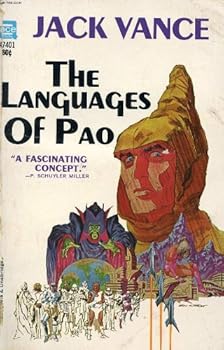
![]() The Languages of Pao by Jack Vance
The Languages of Pao by Jack Vance
Jack Vance is known as a master stylist who, at his best, has an exquisite way with the written English language, a tribute in many ways to his idols P.G. Wodehouse and the unjustly forgotten Jeffery Farnol, among others, but Vance is also a writer of thought-provoking and unique ideas. The Languages of Pao is Vance at the top of his game as far as exploring unusual concepts. The premise of the story is based on a theory known as “Linguistic Relativity” or the “Sapir–Whorf hypothesis” and in layman’s terms it basically means that the language a person speaks shapes human thought patterns and behavior, in both individuals and societies. Vance has here taken the theory to its logical extreme conclusion in a far future time, where a group of “wizards” use the method to attempt to change the mindset of an entire planet to suit their own agenda.
Young Beran Penasper is heir to the Panarch (hereditary ruler) of the Planet Pao. The Paonese people are mild mannered, pacific, conservative and in the main subservient to their ruler. Wars and strife are for the most part unknown, although the population will sometimes engage en masse in work slowdowns or strikes if they collectively feel that their rulers are too harsh. At the beginning of the story Beran is a diffident quiet youngster who is mostly ignored by his father, the reigning Panarch. His uncle Bustamonte spends a good bit of time with Beran as he approaches his teenage years, and seems to be patiently mentoring his young nephew with no ulterior motives.
 Because of their pacific nature, surrounding planets which are more aggressive view the Paonese as ripe candidates for conquest and tribute. Beran’s father has plans to hire scientists known as “wizards” from the famous and feared Breakness Institute to help Pao develop a defense against such aggressors, most notably their enemies the Brumbo Clan, from the planet Batmarsh. However, during a meeting with Lord Palafox, a “Breakness Wizard” who is in negotiation with the Panarch for setting up such a defense, Beran’s uncle uses mind control on the young man, causing him to unwittingly assassinate his own father. Bustamonte intends to also kill Beran and then proclaim himself ruler, but Lord Palafox rescues Beran for his own agenda and takes him to the planet Breakness for training, possibly to use later on as a weapon against Bustamonte or as a bargaining chip in future dealings with the new Panarch. As Beran grows up on Breakness, he learns the secrets of the “wizards” and their powers, along with the megalomaniacal ambitions of his rescuer Palafox regarding his Paonese home world.
Because of their pacific nature, surrounding planets which are more aggressive view the Paonese as ripe candidates for conquest and tribute. Beran’s father has plans to hire scientists known as “wizards” from the famous and feared Breakness Institute to help Pao develop a defense against such aggressors, most notably their enemies the Brumbo Clan, from the planet Batmarsh. However, during a meeting with Lord Palafox, a “Breakness Wizard” who is in negotiation with the Panarch for setting up such a defense, Beran’s uncle uses mind control on the young man, causing him to unwittingly assassinate his own father. Bustamonte intends to also kill Beran and then proclaim himself ruler, but Lord Palafox rescues Beran for his own agenda and takes him to the planet Breakness for training, possibly to use later on as a weapon against Bustamonte or as a bargaining chip in future dealings with the new Panarch. As Beran grows up on Breakness, he learns the secrets of the “wizards” and their powers, along with the megalomaniacal ambitions of his rescuer Palafox regarding his Paonese home world.
Vance is one of the best imaginative writers at coming up with unusual future human cultures, and the Breakness wizards with their individual agendas and desires are something straight out of an Ayn Rand dream and among some of Vance’s more interesting creations. Their idea of changing the language of differing Paonese groups as a way of developing a warrior, engineer and merchant classes or castes on the planet over a generation is intriguing and the tension over whether or not they will accomplish this and what the unforeseen consequences will be is of interest to both Beran as he grows up and begins to plot his own course and the various parties involved, including the wizards and the newly emerging Paonese.
While there are long periods of very little action in the narrative of this story and Beran is probably one of Vance’s more passive characters (perhaps in keeping with his Paonese early upbringing?) this is still one of my favorite books in the Vance oeuvre. It’s a little short, and could have perhaps used some fleshing out of the main premise, but it still captures the reader’s interest.
The Languages of Pao was first published in a shorter version in Satellite Science Fiction magazine in 1957 and then as a longer book in 1958. It’s been reissued many times over the years and is pretty easy to find in used paperback and in most libraries. It’s also available in e-book format. While not at the level of Vance’s major masterworks such as THE DYING EARTH or LYONESSE, it’s a book that any Jack Vance fan should read, as well as anyone interested in speculative fiction as a student of new ideas.



“It’s a little short, and could have perhaps used some fleshing out of the main premise, but it still captures the reader’s interest.”
The fleshing out fell victim to the editorial blue pencil. The Vance Integral Edition published the reconstructed whole, which IMO elevated the stature of this work significantly. That version is available at jackvance.com as an ebook in the well-known formats.